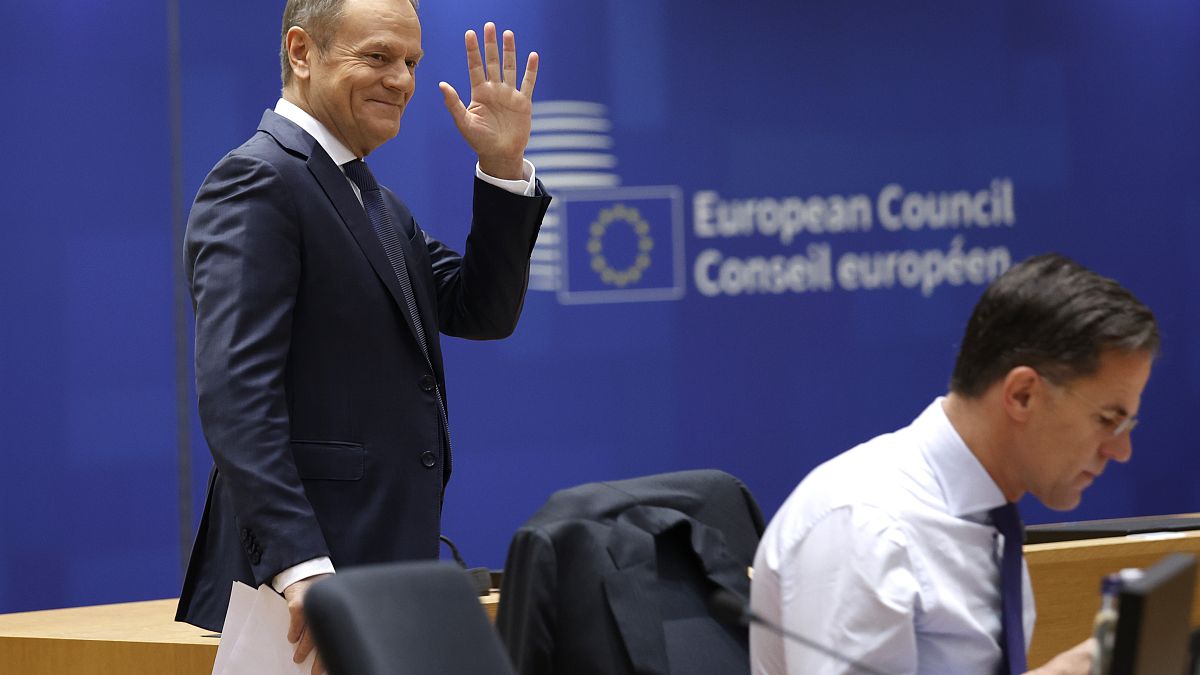Poland’s new prime minister Donald Tusk was sworn in this week as he pledged to respect the law and to obey the constitution, something the outgoing Law & Justice Party has been accused of not doing.
The former EU Council president then returned to his old Brussels stomping grounds for a crunch leaders' summit.
"I'm really happy to be here again. Yeah, Poland is back here in Europe. And this is, for me, the most important moment in my political life," Tusk said on Wednesday.
One of the things he and his colleagues discussed was migration, although it was drowned out by Hungarian Prime Minister Viktor Orbán's objections to continued financial support for Ukraine.
Orbán opposed Brussels’ proposal to provide €50 billion from EU coffers to Kyiv through to 2027, a decision that requires the unanimous blessing of all EU leaders.
The €50-billion ‘Ukraine Facility’ - made up of €33 billion in low-interest loans and €17 billion in non-repayable grants - is pegged onto a broader €100-billion review of the EU’s long-term budget, known as the Multiannual Financial Framework. A group of northern countries fiercely opposed the hefty size of the top-up and bargained for a scaled-down review.
Despite the fiasco of the financial aid, the summit delivered a momentous breakthrough when leaders agreed to begin accession negotiations with Ukraine and Moldova, two countries that submitted their membership bids in the early days of the war. The green light is seen as a stern rebuke to Vladimir Putin's forceful attempts to exert control over Russia's immediate neighbourhood.
Member states also granted Georgia the status of candidate country, prompting street celebrations in the nation's capital, Tbilisi.
Additionally, the bloc will open negotiations with Bosnia and Herzegovina "once the necessary degree of compliance with the membership criteria is reached." The Balkan country's progress will be assessed in progress set to be unveiled in March.
"It's a very powerful political signal, it's a very powerful political decision," President Michel told reporters after the blessing became official.
"And today and tonight I think, to the people of Ukraine, we are on their side and this decision made by member states is extremely important for the credibility of the European Union."
"It was important that no member state would oppose the decision and this is why we were in a position to make this announcement tonight," Michel added.
Hungary gets its money
This was all amid the backdrop of more drama with the Hungarian prime minister after the European Commission allowed on Wednesday the release of €10 billion in cohesion funds for Hungary, almost a year after the money was frozen over the country's failure to address persistent rule-of-law concerns.
It means the Hungarian government will be able to submit reimbursement requests of up to €10.2 billion to finance development projects across the country.
"We have received sufficient guarantees to say that independence of the judiciary will be strengthened in Hungary," said Didier Reynders, the European Commissioner for Justice.
"Today's decision is however not the end of the process. We will continue to carefully monitor the situation and will react early on in case any backslidings were to occur."
The European Parliament disagreed, however.
In a joint letter, the four main groups of the Parliament expressed a similarly skeptical view, asking the Commission to wait at least until the elections to the National Judicial Council conclude on 10 January before issuing a positive assessment.
"It is the duty of the Commission to continue to check that none of the reforms are reversed or weakened afterward by an overnight decree or conflicting legislation," the leaders of the EPP, S&D, Renew Europe and Greens said on Wednesday.
